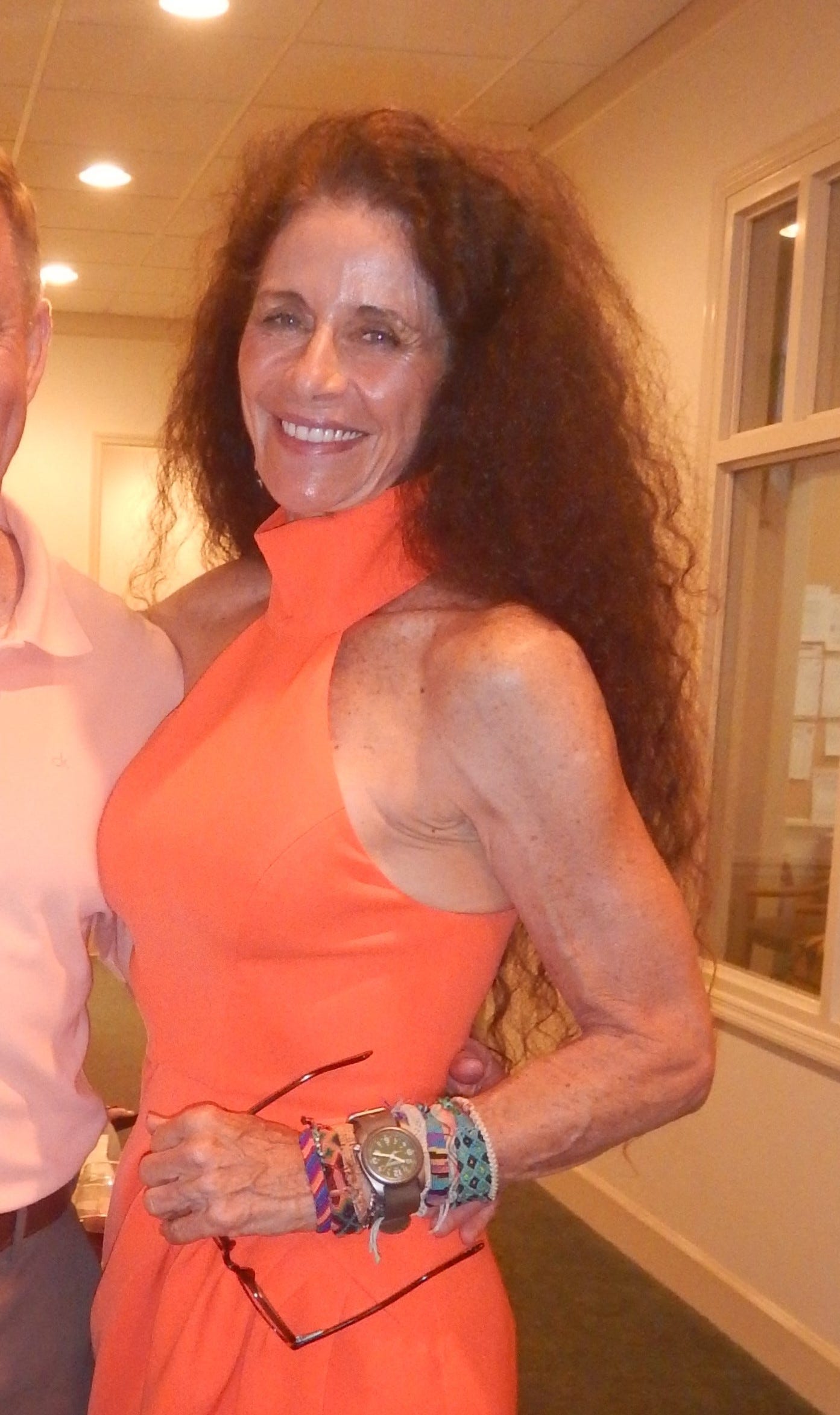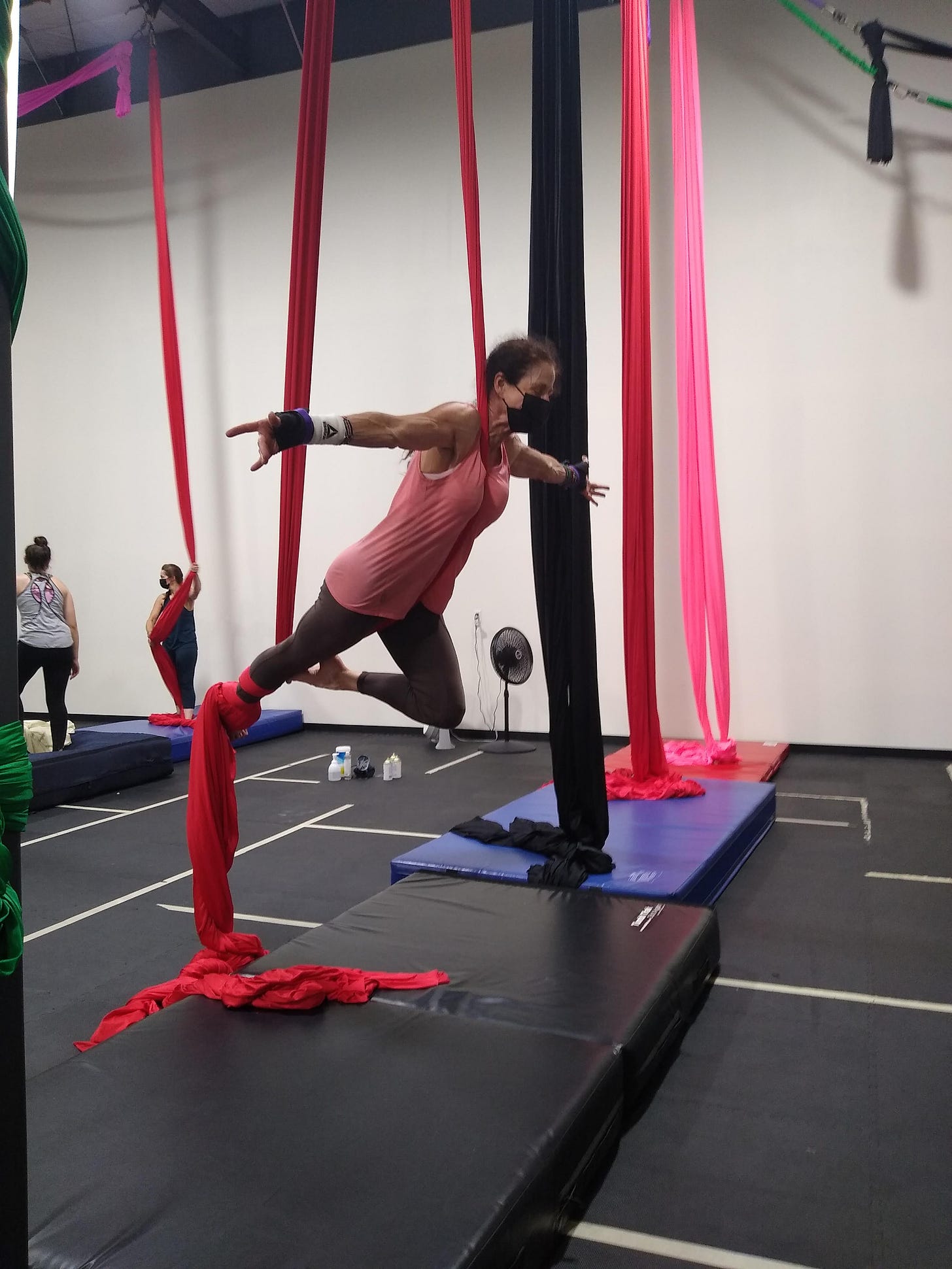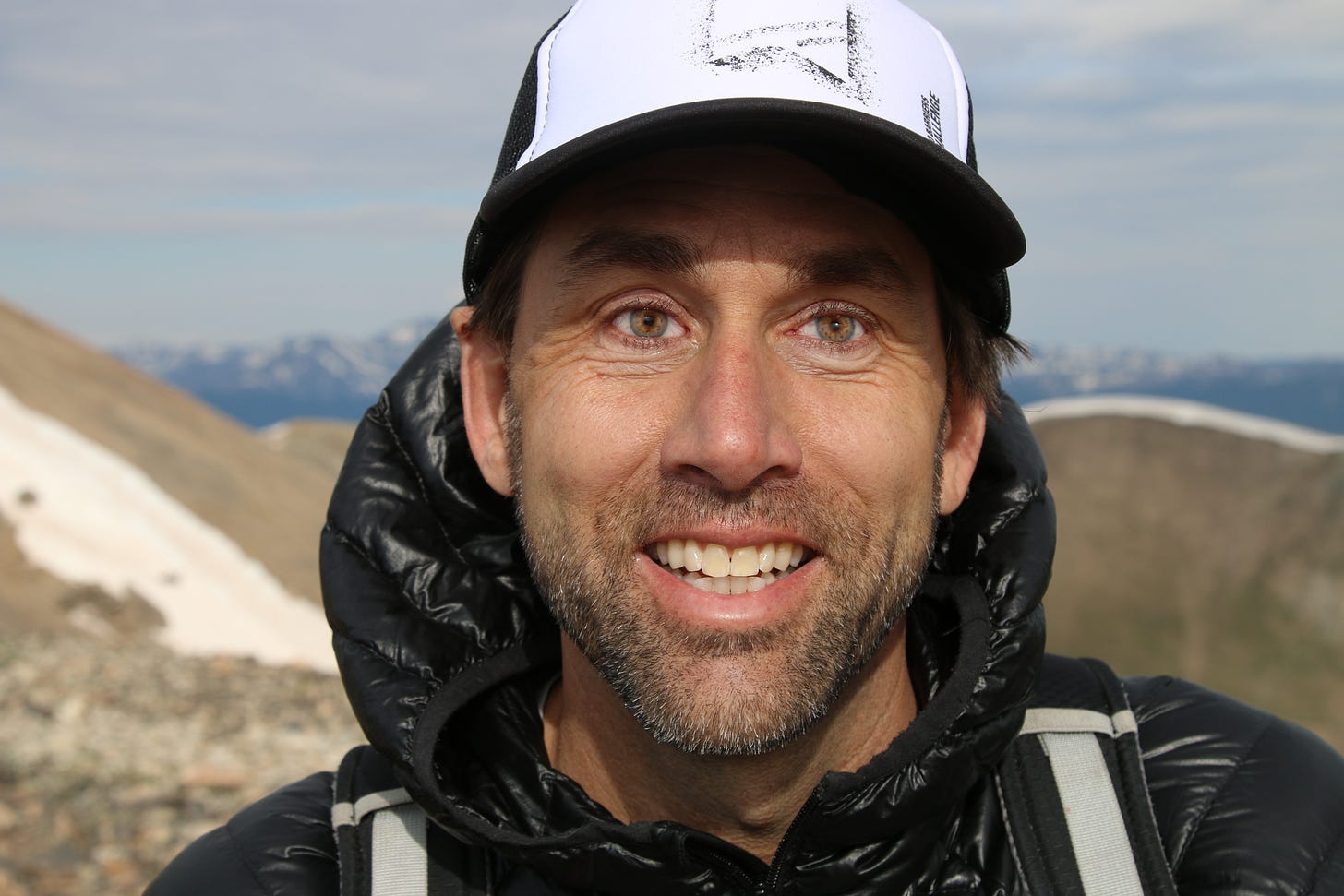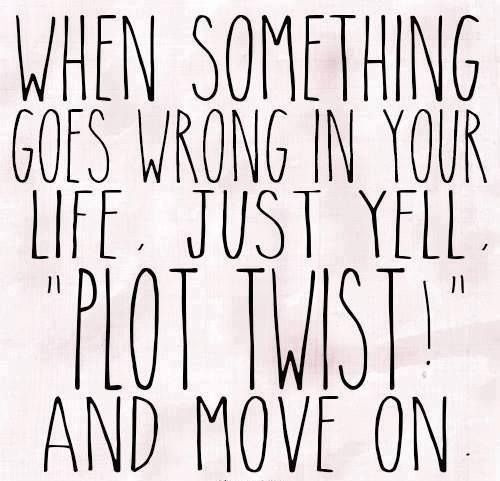You and I Are Too Old To Hang On To Dusty, Decrepit Old Versions of Ourselves
Too Old for This Sh*t: How to Take Your Life Back from an Ageist Society

It’s almost February. Where are you? What body are you inhabiting these days?
Our gym at the Y is starting to empty out. All those eager folks have gotten a taste of just how challenging it is to be there before dawn.
It’s not for everyone.
Perhaps the saddest sight, for me, is to watch fellow older folks show up, full of good intentions, then swiftly give up.
Too often, the older men will pick up weights that corresponded with the man they were forty years ago. The reality of a 35-lb dumbbell is a shock if you haven’t lifted anything heavier than a beer since you were 30.
It can be hugely embarrassing to our delicate egos to try to sling that kind of iron only to find that you have to put them down on the first try, and then head for the kiddie weights.
For women, it’s worse, because of how society judges us. They swiftly realize how difficult it is to do what that Pretty Young Thing over there is doing.
Then they look at themselves and don’t see that PYT they once were, and give up. I most assuredly understand the feeling.
The younger, stronger versions of those people have left the room years ago. Yet so often that’s the person we most closely identify with, not the one we are today.
My younger (not stronger) version of me has been gone for decades. The older and stronger version is the one I get to inhabit today.
The person we are today needs our full attention and commitment. Our love and respect. Our mercy, if you will, for having changed, evolved, and aged.
Let’s deal with the people we are right here, right now.
Without judgment, please.
People like
write about what it’s like to have been an athlete, then to have a devastating cancer diagnosis. These days she paints and writes, and teaches through her current journey. That’s what I mean.Eight years ago I was in fitness model shape. At the time I had no idea that I was also about to have a lovely time with kidney stones and a garden variety of other issues, and about to start a long, painful journey of some twelve major surgeries.
Seven years of that and I am finally seeing the end of the journey. Two more surgeries to go this year. Meanwhile, the adventure athlete that I had been, starting at sixty, has had to morph to accommodate reality.
These days I’m still fit, but few things in my closet from back then fit me (like the above dress). I’m still an athlete, but the range of what I can do has shifted with the physical reality.
We can be pissed, or we can deal. When we deal with the hand life dealt us, we can continue to play.
You and I deserve to be proud of what we have accomplished. The trick is to avoid having our previous accomplishments lock us into an identity that doesn’t breathe life into the present.
Be proud of your geography. Own what you’ve done and who you were. But beware the cost of having those identities limit your present and future selves.
In many ways what we can no longer do makes way for us to do ever so much more in different ways, yet some can’t let go of what was.
Fans of Bruce Springsteen might be thinking about Glory Days. I sure am.
What powerful identity in our past is acting like barnacles on our bodies, anchors in our lives, keeping us from moving forward?
My identity as an adventure athlete has had to take back seat to major repairs. I get to roll it back out when and if my body can handle the demand. If not, then I get to redirect.
That identity is in transition as I train my body back to strength, and reconsider my life options at this juncture. I’m around weights a lot, and I see lots and lots of folks much younger than I am.
Stronger than I am these days (shoulder surgery will do that).
Yet very so often at my gym I watch a PYT do something and I decide I’m going to bloody well give it a try. Like the BOSU ball.
Sometimes I master it, sometimes I don’t. I’ve been quite stunned by what I have been able to do, regardless of age or the insults I’ve visited on myself.
Before I had surgery which forever changed what I could do with my hands, I tried aerial silks. I am so glad I did. I just wanted to try it, and it was amazing.
So were the face plants. They were spectacular and absolutely worth it.
I doubt I’ll look like a fitness trainer again, but by god my body can still do amazing things.
I love a body, scarred, busted up, full of metal and with parts missing, that can still do amazing things. Yours, mine, anyone’s.
That’s this body. Busted up, scarred, tested, tried, full of metal and screws. What can yours still do? Can we be grateful to still be mobile, strong, active, engaged, and let bloody go of needing to look young?
What version of yourself are you inhabiting?
Not long ago I had a profile on Match.com. Twenty-six photos of what I was doing and loved: adventure travel including horses, kayaking, climbing huge mountains, rafting, skydiving, paragliding.
Some guy in his sixties wrote a scathing attack, accusing me of arrogance. All I did was show myself doing what I love to do, what excited and moved me. I guess it’s arrogance to express your love of life, but that’s just me.
It’s not bragging if you’ve done it. For him, for his generation, a Boomer woman as an adventure athlete in her sixties was arrogant, bragging and offensive. How dare you, he wrote.
GTFU.
He said he’d climbed Everest in his twenties. His profile made it clear that his achievement, while considerable, had ended there.
I’m not sure what he’d done for the next forty years but he hadn’t taken care of himself. I don’t know his story, but it was clear he was angry at me for living such an outsized life at this age, when his outsized life had apparently ended before thirty.
Erik Weihenmayer is blind. At the age of 33 he climbed Everest, too. Earned a spot on the cover of TIME magazine. Now 56, he continues to push all kinds of boundaries. He never stops. Weihenmayer changed his life and continues to change other people’s lives because he doesn’t rest on his laurels, which are considerable.
Here’s what to know about Eric:
He completed the Seven Summits in September 2002, one of only 150 mountaineers at the time to do so, but the only climber to achieve this while blind. In 2008, he also added the Carstensz Pyramid thus completing the Eight Summits. Weihenmayer has also made noteworthy climbs up the Nose of El Capitan in Yosemite in 1996, and ascended Losar, a 2,700-foot (820 m) vertical ice face in the Himalayas in 2008.
In 2005, he co-founded No Barriers, a nonprofit organization that helps people of diverse backgrounds and abilities to attack challenges head on, problem solve, build winning teams, and serve others. In September 2014, Weihenmayer and blinded Navy veteran Lonnie Bedwell kayaked the entire 277 miles (446 km) of the Grand Canyon, considered one of the most formidable whitewater locations in the world. Today, while still adventuring, he is a prominent worldwide speaker, focusing on the topic of living a "No Barriers Life."
Eric is in fact defined by how he pushes past his limits.
Weihenmayer said that on the way down Everest to meet the press eager to ask him about his accomplishment, his guide said to him,
“Don’t let your trophy room become your mausoleum.”
I’ve rarely read anything more profound. He took it seriously.
You and I don’t have to be Eric. No matter what we might have accomplished earlier in life, once we met that goal, it’s already an old story. What do we get to build on next?
This is precisely why James Clear addresses habits instead of goals. Eric climbed Everest. Okay, what’s next? You don’t have to top that. You just move on to the next phase of your life, the next moment, the next iteration of you.
Great habits allow you to keep on evolving. A goal can become an anchor, if we’re too attached to that achievement.
I climbed Kilimanjaro in 2013. Within seven months I had done Macchu Picchu, then Everest Base Camp. Kili was just a warmup.
Since then I’ve been all over the world doing all kinds of things that people dream about, talk about, but never get around to doing.
I did adventure travel for fourteen years. After lots of injuries I underwent twelve major surgeries to fix what I had bent, busted and banged up.
Two more to go, then what’s available for my next chapter will become more clear. If I can get the use of my feet back, then a great many more doors will open. We’ll see.
If I don’t get the full use of my feet back, that’s a different trajectory. Life ahead is always shifting and moving. The invitation for us is to move on anyway, and shed identities that don’t work along the way.
I can’t wait. I’m working on part of it right now. That new chapter involves letting go of everything I know and leaping into a brand-new void. As with all major changes, there’s not much I can take with me.
That, perhaps, is the whole point.
People like
are a great example of how we morph as we age. She went through a divorce, a mother with dementia passed…and then she embarked on a huge long walk in Spain to clear the air, clear her mind and spend precious, irreplaceable time with her daughter.Those are life-transforming, reaffirming events.
When we experience a huge loss, that is often the best time to shed something in our grief, and make ourselves available for what may appear next.
Her journey is precisely what I’m addressing here.
has done precisely the same thing after suffering a deep emotional betrayal.As our bodies change, we grey, wrinkle, as we lose agency in some areas and potentially gain it in others, are you hanging on to ancient versions of yourself for safety and security?
Are you hanging on to a younger version of yourself, and in the process keeping the newer, better, wiser self from living their best life?
This morning I am doing a photo shoot for a new website and a new speaker’s one-sheet. I was putting on mascara, something I’ve not done once in the last fourteen years. I was stunned to discover that I no longer had the long, sweeping eyelashes that defined my youth.
I have little stubblies left. My lashes, once long and luxurious, the envy of many, have left the building. So has my 23” waist.
What a waste to continue to mourn such things. They’re gone.
So is some of my dexterity.
I drop things all the time these days. That’s one of the side effects of having the CMC joints removed from your hands. You learn to buy cheap coffee mugs and to NOT handle expensive antiques unless you have a big bank account.
You also learn to have a sense of humor.
Will I mourn my lost lashes or will I celebrate the fact that I’m about to embark on yet another business journey?
One of those choices is joyful. The other is mired in bitterness and loss.
Each achievement we have earned is part of the foundation which supports where we go next. Let’s use those achievements, those identities to help us move into the next, best verstion of who we can be.
Let’s get back to the gym (or whatever gets you moving). Do the work. Eat good food. Fall in love with who you are right here, right now.
Let’s play.
Thank you for reading this free article. Please consider








Thanks for your motivational essay and your mention, Julia! I've found myself loving the challenge of conquering my phobia/fear--internal summits rather than external ones. One of those summits is the water, and I'm proud of myself for having the courage to learn swimming from scratch in my 5th decade of life. Swimming has become a new passion and a gift that keeps on giving. And as you said, it's the habit that moves us forward, not the goal. I just keep attending my weekly classes and do self practice once a week. I've been making progress. Never would I have dreamed that I could swim laps without fear in this life time! Besides conquering the fear of water, I've also realized how pursuing this new hobby/sports has taught me to stay in the body instead of in the head. Translated into the art of living, it makes all the difference!.
I've never been able to really enjoy my accomplishments. I've run over one hundred marathons including qualifying and running Boston in my 40s, plus I've run about a dozen ultra marathons. Then I bought a bakery, and I had no time to run. How I missed it. After selling the bakery I injured my knee and running was out of the question, I could only walk,and not so well. Then a person dear to me died and my first experience of grief swamped me for a year. Then menopause. My body changed, and I didn't like the changes, but I felt frozen by too many demands on my time, and of course the tyranny of my fittest, most flexible fleetest self, in the not-too-distant past. Then (now) I experienced a terrible betrayal, and I find myself needing to move, which has always been my way of addressing mental anguish. I started lifting weights again, and doing yoga. I wasn't trying to lose weight so much as gain that old feeling of strength and fortitude. To my surprise, my muscles responded in gladness, my body quickly transforming, letting me know I am not as old as I think, just as old as I feel. And every day, I feel better and better, like I am cracking a carapace. I haven't fully emerged but I can see snatches of blue sky and breathe the fresh air.
I'm still mad at that guy who castigated you for his own inferiority complex. It's hard on a man's ego to see a woman with better guns (arms) than him, I guess.
Just loved this essay and it came along for me at exactly the right time.